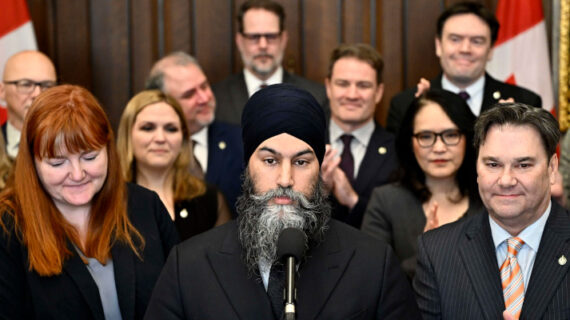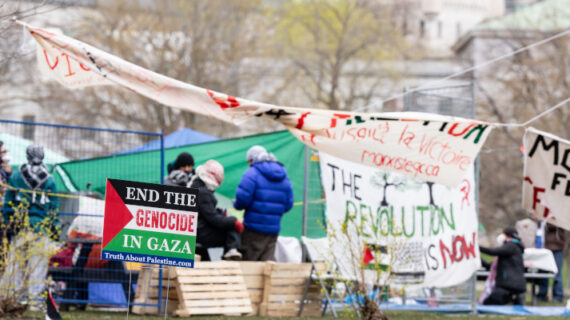This week saw the continuation of the much anticipated foreign interference inquiry, with testimony ranging from MPs allegedly targeted by foreign actors, to federal party campaign officials, to a politician accused of acting on behalf of a hostile foreign country.
Canada’s Foreign Interference Commission is being held in two phases. The first phase primarily focuses on China, Russia, and other state actors’ foreign interference activities in the lead-up to and during the 2019 and 2021 federal elections, as well as the government’s response. The second phase will examine the ability of federal departments and agencies to detect, deter, and counter foreign interference. Commissioner Justice Marie-Josée Hogue has been overseeing the inquiry, which will see up to 40 witnesses from various groups testify.
Witnesses range from politicians, heads of CSIS and the Communications Security Establishment (CSE), the RCMP, Global Affairs Canada, human-rights groups, and diaspora community leaders.
On Wednesday, Prime Minister Trudeau announced he will be testifying in the inquiry next week.
Here are five tweets from Canadians reacting to the inquiry so far.

Former Liberal MP Han Dong’s testimony caused a stir on X, formerly known as Twitter. Last year, the Toronto MP left the federal Liberal caucus after facing allegations he was working with representatives of the Chinese government. He now sits as an Independent but wants to return to caucus. During this week’s proceedings, he claimed he personally hadn’t seen “any evidence” that the People’s Republic of China is trying to interfere in Canadian democracy.
Dong stated that, contrary to reporting, he did not recall the conversation he was alleged to have had with a top Chinese diplomat recommending China hold off releasing imprisoned Canadians Michael Kovrig and Michael Spavor. The former diplomat and consultant were detained in China nine days after Meng Wanzhou, the CFO of Huawei was arrested in Canada. They ultimately spent 1020 days in jail.
Dong has filed a $15 million defamation lawsuit against Global News and its parent company Corus Entertainment, which initially reported his alleged involvement with Chinese state representatives.
Before resigning from his post, special rapporteur on foreign interference David Johnston cited “irregularities” in Dong’s nomination process, along with “well-grounded suspicion” that the activities were tied to China’s Toronto consulate. During this new inquiry, Dong was asked about intelligence reports that stated buses were used to transport supportive international students (likely of Chinese descent) to his 2019 nomination vote. Following confusion over which buses and voters were being referred to, Dong’s campaign director insisted voting students would have had to prove they were permanent residents before ticking a box.
However, the inquiry also raised the fact the Liberal Party of Canada does not require card-carrying voting members to be citizens or permanent residents of Canada, as pointed out by Globe and Mail reporter Steven Chase.
While the Conservatives require members to be citizens or permanent residents, the NDP provides membership to “residents of Canada”.
Meanwhile, former Conservative leader Erin O’Toole told the inquiry this week he felt that five to nine ridings located in the Lower B.C. mainland and the Greater Toronto Area were targeted by Chinese foreign interference during the last election.
In documents provided to the Commission, he also alleged that Chinese foreign interference may have actually played a part in him getting ousted as Conservative party leader in 2022.
Suspicion arose when Conservative Party member Bert Chen, who served in the party’s national council, launched a petition to recall O’Toole as party leader. O’Toole has accused Chen of having ties to the Chinese government, after trusted sources from what he described as “a diaspora group and a journalist…advised [him] in confidence.” Despite the information not being corroborated, O’Toole says he trusts his sources.
Chen immediately denied allegations, claiming he started the petition to elect a new party leader because “…O’Toole was not fit to lead our country or our party.” Conservative Party spokesperson Sarah Fischer said that O’Toole’s allegations were “ridiculous.”
Some groups have said the foreign interference inquiry is not a safe place to voice their concerns. Back in late January, when preliminary hearings were being held, the Uyghur Rights Advocacy Project (URAP) withdrew from testifying, stating that members of the diaspora were at risk and the process would not protect them. A month later, Canadian Friends of Hong Kong said they would not participate.
Both groups cited concerns about the inquiry granting intervener status to Senator Yuen Pau Woo and full standing to former Ontario Liberal cabinet minister now Deputy Mayor of Markham Michael Chan and former Liberal MP Han Dong. All three have been accused of having deep ties to the People’s Republic of China, which they deny.
However, not all diaspora and human-rights groups have withdrawn from testifying. When the World Sikh Organization (WSO) applied for standing, it was on the basis of describing itself as “Canada’s only Sikh advocacy organization” and being able to speak to Indian interference in Canada. WSO Director Jaskaran Sandhu has since testified, concerning the killing of Sikh separatist leader Hardeep Singh Nijjar and India’s alleged involvement.
Singh Nijjar’s death became the subject of major diplomatic tensions between Canada and India after Prime Minister Trudeau claimed there was evidence the Indian government was behind the fatal shooting. Sandhu described the killing as being “the cost of foreign interference.” India has not responded to this testimony and has vigorously denied allegations of their involvement in his murder.
Inquiry proceedings have shown concerning threats to Canada’s sovereignty and national security. Security expert Thomas Juneau highlighted the need for major reform, including more thoroughness in intelligent briefings. He was responding to testimony from the three main federal parties, who revealed they were basically left in the dark about warnings that the Chinese government would likely make attempts to influence the 2021 campaign.
The Commission’s initial report is due to be released on May 3rd. A final report is expected by the end of this year.




